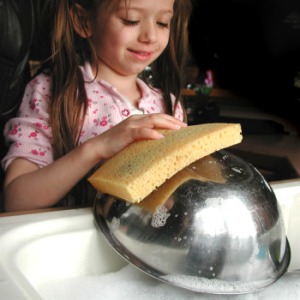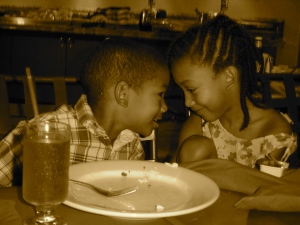My three oldest kids were off doing various activities, which left me and my husband and the 3-year old. We decided it would be a great idea to go to a restaurant. I love taking my kids out to eat. They need to learn how to behave in society and what better way than to go out with the family?
You may have heard the recent news about restaurants across America banning children. Frankly, I think this is terrible. Kids are kids and they do kid things like annoy people. Parents have a right to go out and bring their children with them to enjoy a nice family time.
My post today will give you handy tips you can use to train your children while eating at a restaurant.
If you don’t take your kids out to eat for fear they will misbehave, choose a time that is specifically for “training”. Lay down the rules before you go. See how they do, they might surprise you.
Restaurant Rules for Kids
* No yelling, running or acting like a fool
* If rule #1 is broken, we will get up and go home. Period. (you really have to mean this one)
* If everyone behaves well, dessert at the end of the meal!
Now, some guidelines for you, the parent:
1 – Choose wisely
Come on people! Don’t take your kid to a four star restaurant! Use some common sense! First of all, they won’t appreciate the expensive, good food anyway. Secondly, there is a higher probability that any normal kid behavior will be frowned upon by the other patrons and result in your family being banned from future visits.
Pick a restaurant that is kid friendly but requires them to wait for service. NOT fast food. That is too easy. Denny’s is a good starter. Family-owned diners are great for restaurant training too. You want the noise level to be talkative but not too stimulating. Save Hard Rock Cafe for when they’ve proven themselves.
2 – Come prepared
Depending on the age of your child, you’ll want to come prepared with things to do. Coloring books and crayons work for any age range. Blank paper to play hangman or just to draw for the older kids. A book of jokes is great fun and you can take turns telling them.
3 – Focus on your kids, not the adults at the table
I know it is natural to want to discuss adult things with your adult companions but restaurant training is not the time! Save it for later. Maybe during dessert. The younger your child is, the more attention they will require. Otherwise, you will have sugar and salt and pepper all over the table. I’ll tell you the story about the hot sauce later.
4 – Help your child order but let them make the final decision on food.
Going to a restaurant is a great safe place to let your child start making “grown up” decisions, like what to eat. If it turns out they don’t like it, it’s okay. Let it be okay. You can doggie bag it and eat it later.
5 – Before you go, take a chill pill.
Assume that something will go wrong. Assume that there will be a meltdown. Plan for it. Prepare mentally for it. And then go and have a great time with your kids. Remember, they will learn how to behave when they are shown the proper behavior. It’s not intrinsically wired in their heads. Kids, like all of us, need to have opportunities to show us what they are capable of.
The Hot Sauce Story
When my 11-year old son was 3, we took him to Denny’s. Note, he hadn’t gone through my training at that point. This was one of his first times out at a restaurant. He was a super, super active toddler. I thought he was ADHD but no, he just had extra energy. I am sitting at the table with his dad and sister. He is going under the table and acting, yes, a fool. I was continually admonishing him and trying to get him to calm down. His father was far more permissive than I liked. Then he started playing with the bottle of hot sauce. I told him, “Put that bottle down. It’s super spicy! You’ll burn your mouth!” His dad said, “No, let him play with it.” Dear readers, for those of you that have toddlers, we all know what they do most and we all know what came next. My son put the bottle top in his mouth and then started crying because the sauce was so hot. We got him some milk and bread and that seemed to help. All was well at the end of the day. And now he loves to put hot sauce on his food. Go figure.







